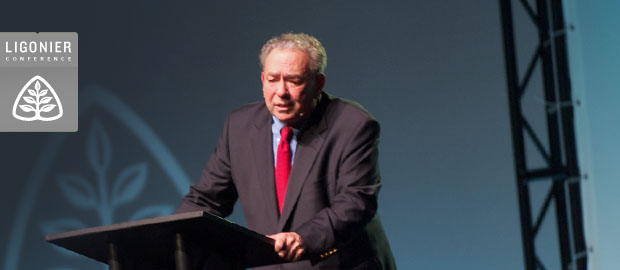Session 1, R.C. Sproul — 2012 National Conference

Dr. R.C. Sproul opened the 2012 Ligonier National Conference, examining the theme The Christian Mind. In his lecture, carrying the provocative title "Have You Lost Your Mind?" he stated that we are living in the most anti-intellectual climate in the history of the church. "There has been a wholesale rejection of the significance of the mind in living, particularly Christian living," he said.
Dr. Sproul then proceeded to examine the relationship of the mind to the body, the will, and the heart. Here are some highlights.
First, Dr. Sproul explored the relationship between the mind and the body.
Dr. Sproul asked audience members to raise their right hands. He then explained that he made a request, that he gave the audience "a piece of his mind," assuming that his hearers would understand it. When they heard it, they understood and responded with a bodily action. He then asked: How can an idea, which is non-physical, give rise to a physical action, which is material? What is the relation of mind to matter?
The brain is material, he affirmed, but the mind is not. We must distinguish between the organ in our bodies and the thoughts we have. This crucial distinction is the reason why, when we die, we continue to have a consciousness that endures forever.
If I want to know what you really believe...I have to look at your life. —R.C. Sproul #lmnc
— Ligonier Ministries (@Ligonier) March 15, 2012
Dr. Sproul then summed up the long history of philosophical speculation about the relationship between thoughts and actions. Although the relationship is not fully understood, from the biblical perspective, there is a relationship. The Bible says, "As he thinks in his heart, so is he" (Prov. 23:7). The life reveals the way a man thinks.
Second, Dr. Sproul explored the relationship between the mind and the will.
We tend to think the faculty of choosing is found in the will, Dr. Sproul said. But where is the will located? To ask the question another way, what is the will? How does it function?
The magisterial work on this question is The Freedom of the Will by Jonathan Edwards. He defined the will as "the mind choosing." So although we distinguish between mind and will, Edwards said choices are a function of the mind. In the final analysis, for a choice to be made, there is a voluntary conscious choice. We consider our options, inclinations, and desires, and choose what our minds deem to be best for us at the moment. Not only may we choose what we most want to do at a given moment, we must choose what we want to do at that moment. This means we never choose anything against our wills. All the things we do are voluntary acts.
We might say that choosing according to our strongest inclinations means our freedom is restricted. It is a kind of determinism. But it is self-determinism, which is the very essence of freedom.
In our natural state, we have no inclination to choose the things of God. We want to escape Him. We cannot make a decision to choose an inclination. The inclination must change if the decision is to change. Only God can change our natural inclination.
Third, Dr. Sproul explored the relationship between the mind and the heart.
In his book Classical Apologetics, Dr. Sproul said that in the Christian life we recognize both the primacy of the mind and the primacy of the heart. That sounds contradictory, but he meant that each is primary in a certain sense.
When we stand before God, He will look upon the heart. This means the heart is more important than the mind. However, there cannot be anything in the heart that is not first in the mind. If we want the heart to change, we must change the mind. That is what Christian sanctification is all about—the renewal of the mind (Rom. 12:12).
 Dr. R.C. Sproul is the founder and chairman of Ligonier Ministries, president of Reformation Bible College, and can be heard teaching daily on the radio program Renewing Your Mind, which broadcasts on hundreds of radio outlets in the United States and worldwide. Dr. Sproul is also senior minister of Saint Andrew's, a Reformed congregation in Sanford, Fla., and he has authored more than seventy books on theology, apologetics, and other topics, including Defending Your Faith, Lifeviews, and The Donkey Who Carried a King. Dr. Sproul and his wife, Vesta, have two children, eleven grandchildren, and two great-granddaughters.
Dr. R.C. Sproul is the founder and chairman of Ligonier Ministries, president of Reformation Bible College, and can be heard teaching daily on the radio program Renewing Your Mind, which broadcasts on hundreds of radio outlets in the United States and worldwide. Dr. Sproul is also senior minister of Saint Andrew's, a Reformed congregation in Sanford, Fla., and he has authored more than seventy books on theology, apologetics, and other topics, including Defending Your Faith, Lifeviews, and The Donkey Who Carried a King. Dr. Sproul and his wife, Vesta, have two children, eleven grandchildren, and two great-granddaughters.